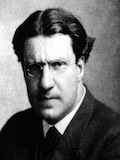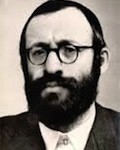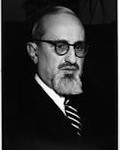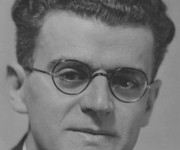Rabbi Dr. Stephen S. Wise (1874-1949) was the most prominent and influential Jewish leader of his time. He headed an array of communal institutions, including two major defense groups, the American Jewish Congress and World Jewish Congress, as well as the American Zionist movement; the Free Synagogue, in New York City, and a rabbinical seminary, the Jewish Institute of Religion (later to merge with Reform Judaism’s Hebrew Union College); and the monthly journal Opinion. At the same time, Wise was deeply involved in numerous liberal political and social causes. He was a founder of the American Civil Liberties Union, a board member of the National Association for the Advancement of Colored People, and an activist for women’s suffrage, labor rights, and international disarmament. He took part in the investigation of the Triangle Waistshirt factory fire, raised funds for striking textile workers, campaigned for the freedom of Sacco and Vanzetti, and was involved many other political and social struggles.
In his early years, Wise earned a reputation as someone who was not afraid to cause controversy. He established the activist, ethnically assertive American Jewish Congress (in 1918) as a challenge to the elitist and undemocratic American Jewish Committee. He was an outspoken Zionist at a time when the vast majority of his fellow-Reform rabbis were anti-Zionist. He led “Stop Hitler Now” rallies in the 1930s, at a time when other Jewish groups, notably the AJCommittee and B’nai B’rith, argued that public anti-Nazi protests would endanger German Jewry and provoke antisemitism in the United States.
WISE AND ROOSEVELT
Wise’s relationship with Franklin D. Roosevelt was not smooth at first. After initially endorsing Roosevelt for governor of New York in 1928, Wise and FDR had a falling out in 1931 after the governor refused to take on the corrupt Tammany Hall political machine. During Roosevelt’s first campaign for the White House, in 1932, Wise wrote to his close friend, Prof. Felix Frankfurter, about FDR: “I know him and I know how utterly untrustworthy he is the moment any problem arises, decisions or tactics touching which may adversely affect his own political fortunes. I have nothing but horror at the thought of what Roosevelt will be for four years at Washington.” In another letter to Frankfurter, Wise complained that FDR had “no deep-seated convictions,” “no bed-rock…he is all clay and no granite.” That year, Wise voted for a fringe presidential candidates, the Socialist Party’s Norman Thomas.
Once Roosevelt was in the White House, Wise’s attitude changed. The New Deal reflected much of the social justice agenda to which Wise was deeply committed and he became an enthusiastic supporter of the new administration. In his correspondence he often called FDR “the Great Man” or “the All Highest.” In 1937, he wrote to a colleague: “[I]n the District of Columbia, we have a great, good Friend. He is thinking about us and for us. He is planning for us. We are in his mind and on his heart.” Wise’s practice of “constantly praising Roosevelt” before Jewish audiences played a significant role in “building up the Roosevelt cult among the Jews to a fantastic degree,” in the view of 1940s American Zionist leader Emanuel Neumann.
On the subject of Roosevelt’s attitude regarding the Jews in Germany, however, Rabbi Wise was privately worried. He was disappointed by FDR’s refusal to co-sign a statement with outgoing president Herbert Hoover condemning the mistreatment of German Jews, but chose to hold his tongue because, as he explained to a colleague, he “hesitate[d] to use up any of Roosevelt’s limited time and to add to his terrible cares.” A month later, Wise confided to a friend his disappointment that FDR “has not by a single word or act intimated the faintest interest in what is going on.” Three months later, nothing had changed: “FDR has not lifted a finger on behalf of the Jews of Germany,” Wise wrote to a colleague in July 1933. “We have had nothing but indifference and unconcern up to this time.” In November, he complained to another friend that with regard to German Jewry, FDR was “immovable, incurable and even inaccessible except to those of his Jewish friends whom he can safely trust not to trouble him with any Jewish problems.”
Still, Wise was careful to keep his disappointment behind closed doors. Enthusiastic about the New Deal and wary of irritating a president with whom he had not yet developed a personal relationship, Wise told 1,000 delegates at a conference of Jewish groups in New York City they should be satisfied “that no American ambassador has been sent to Berlin.” It was small consolation, however, and short-lived at that; FDR’s delay in sending a new envoy was not a protest against Germany’s policies, and, in any event, six weeks later, Roosevelt chose his new ambassador.
Wise enthusiastically supported Roosevelt’s re-election campaign in 1936, and subsequent campaigns, and the relationship on occasion yielded dividends on matters of Jewish concern. For example, in the autumn of 1936, when Wise learned of British plans to close off all or most Jewish immigration to Palestine, in response to Palestinian Arab violence. At Wise’s request, Roosevelt leaned on the British to keep Palestine open, enabling some 50,000 European Jews to reach the Holy Land before London’s White Paper shut the doors in May 1939. But that episode turned out to be the exception that proved the rule in Wise’s relationship with FDR.
Wise’s hopes regarding FDR and European Jewry were briefly buoyed when, in early 1938, Roosevelt created a President’s Advisory Committee on Political Refugees (PACPR), and invited Wise to join. However, in the years to follow, FDR almost never consulted with the committee or took its advice.
THE SEARCH FOR HAVENS
In the late 1930s, the Virgin Islands attracted interest from refugee advocates because as a territory rather than a state, its immigration policy was not restricted by America’s quotas. Shortly after Kristallnacht, the Legislative Assembly of the Virgin Islands adopted a resolution welcoming European Jewish refugees. But State Department officials persuaded the president that “all kinds of undesirables and spies” would enter the Islands disguised as refugees, and from there proceed to the United States. “I have sympathy,” FDR told Interior Secretary Harold Ickes, a prominent supporter of the Virgin Islands as a haven. “I cannot, however, do anything which would conceivably hour the future of present American citizens.”
Rabbi Wise declined to support the Virgin Islands proposal, explaining to a colleague in the autumn of 1940, shortly before the presidential election, that admitting refugees to the Virgin Islands “might be used effectively against [Roosevelt] in the [1940 presidential] campaign.” Therefore, Wise said, “Cruel as I may seem, as I have said to you before, his re-election is much more important for everything that is worthwhile and that counts than the admission of a few people, however imminent be their peril.”
In 1940, the Interior Department and the Labor Department endorsed legislation, known as the King-Havenner bill, to promote the development of Alaska, a U.S. territory, through an influx of refugee workers. FDR told Interior Secretary Ickes he would support only a watered-down version of the plan, in which just 10% of the workers would be Jews, so as “to avoid the undoubted criticism that we would be subjected to if there were an undue proportion of Jews.” The State Department and nativist groups strongly opposed allowing any use of Alaska for refugee resettlement, and Roosevelt soon dropped the whole idea. Rabbi Wise did not support the Alaska proposal. “[J]ust because small numbers of Jews might settle there” was not sufficient reason to endorse the scheme, Wise wrote to a colleague. Moreover, he emphasized, talk of settling refugees in Alaska “makes a wrong and hurtful impression to have it appear that Jews are taking over some part of the country for settlement.”
A delegation of rabbinical students that met with Wise in 1942 received a similar response. When the students suggested urging the U.S. to admit Jewish refugees to the Virgin Islands, Wise replied that it was “too hot” for Jews to settle there; when they proposed Alaska, Wise said it was “too cold.”
WISE AND THE HOLOCAUST
Wise characterized the autumn of 1942 as “the unhappiest days of my life.” He was deeply shaken by an August 1942 cable from the World Jewish Congress representative in Geneva, Gerhart Riegner, that the Germans were bent on the mass murder of all the Jews in Europe. Undersecretary of State Sumner Welles asked Wise to refrain from publicizing the Riegner cable until the State Department corroborated its veracity. Wise complied. In a September 16 letter to Frankfurter, he wrote: “I don’t know whether I am getting to be a Hofjude [court Jew], but I find that a good part of my work is to explain to my fellow Jews by our Government cannot do all the things asked or expected of it.” Wise wrote: “I have kept the thing out of the press up to this time,” he wrote Frankfurter, “thus accepting a great responsibility if the threat should be executed.” To another friend, he reported, “I have been unable to sleep since that [Riegner] cable to me…”
On September 4, a second cable to Wise from Europe reported that 100,000 Warsaw Jews had been murdered and their corpses made into soap. Wise wrote to his friend The Rev. John Haynes Holmes that the Warsaw cable “has left me without sleep…I don’t want to turn my heart inside out, but I am almost demented over my people’s grief.”
Three months later, the State Department finally confirmed the veracity of the Riegner message, and Wise released the information at a November 24 press conference in Washington. On December 8, Wise headed a delegation of five Jewish leaders to meet with the president at the White House. Afterwards, Wise told reporters that the president was “profoundly shocked” by the Nazis’ mass murder of European Jewry; that Roosevelt said “the American people will hold the perpetrators of these crimes to strict accountability”; and that FDR promised the Allies “are prepared to take every possible step” to “save those who may still be saved.”
A private account by another participant in the meeting, Jewish Labor Committee president Adolph Held, told a different story, however. In a memo to his colleagues, Held reported that FDR began the meeting by joking about his choice of Governor Herbert Lehman, a Jew, to head the postwar administration in Germany. Rabbi Wise then spoke briefly about the Nazi atrocities. Roosevelt replied that he was “very well acquainted” with the massacres but it would be “very difficult” to stop them since Hitler was “an insane man.” FDR asked the Jewish representatives for their suggestions. Four of them spoke, but “the entire conversation on the part of the delegation lasted only a minute or two,” Held wrote. “The President then plunged into a discussion of other matters.” Of the 29 minutes the delegation spent with the President, “he addressed the delegation for 23 minutes.” As soon as FDR finished speaking, he “pushed some secret button, and his adjutant appeared in the room” to usher the Jewish leaders out. Held made no reference to any promise by Roosevelt to–as Wise put it–“take every possible step” to “save those who may still be saved.”
The description by Held of FDR’s comportment echoes remarks made by Wise’s co-chairman at the World Jewish Congress, Nahum Goldmann, in a briefing he gave in 1944 to David Ben-Gurion and other leaders of the Jewish Agency in Palestine. Here is how Goldmann described a conversation with FDR: “It is impossible to educate him, because you get to see him only once every six months, for thirty minutes, ten of which are spent by him telling anecdotes, after which he expects to hear you tell him anecdotes, and then there are only ten minutes left for a serious conversation–what can one accomplish like this?”
CLASHES WITH ACTIVISTS
Privately, Wise continued to agonize over Roosevelt’s failure to respond to the mass murder. In early 1943, after his daughter and son in law dined with the First Family, Wise wrote to his son James: “Justine and Shad had dinner with the Roosevelts on Saturday, including the President.” Wise indicated he was pleased, that according to Justine, FDR “sent his affectionate regards to me.” But then Wise added: “If only he would do something for my people!”
At the same time, Wise resisted calls by colleagues in the Jewish leadership for greater activism. At meetings in April 1943 of the Joint Emergency Committee for European Jewish Affairs, a new coalition of Jewish organizations, some delegates urged protest marches. Wise blasted the “wild people” in the Joint Emergency Committee whom he said were interested in “calling the President Roosevelt and the State Department names.” Such public criticism of the president was “morally and perhaps even physically suicidal,” Wise warned. He insisted that Roosevelt “is still our friend, even though he does not move as expeditiously as we wish.” The accusing finger should be pointed elsewhere, Wise declared: “He moves as fast as he can, in view of the Congress on his hands, a bitterly hostile and in a very real sense partially anti-Semitic Congress.”
Wise was likewise irritated by the high-profile protest tactics employed by the Bergson Group. “They are a disaster to the Zionist cause and the Jewish people,” Wise wrote to a friend. “Yet see how many names they capture of persons who are well-meaning and friendly to the Jews. It is too sad for words!” Even his own son, James Waterman Wise, lent his name to one Bergson advertisement.
When Wise learned that the presiding Episcopal bishop, Henry St. George Tucker, had agreed to speak at the Bergson Group’s July 1943 Emergency Conference to Save the Jewish People of Europe, he tried to persuade the clergyman to withdraw. Tucker would not budge. Wise did, however, help convince Undersecretary of State Welles that the Bergsonites should be boycotted. On June 23, Welles urged U.S. ambassador Myron Taylor to stay away from the gathering on the grounds that “such leaders as Rabbi Wise, who was with me this morning, are strongly opposed to the holding of this conference [and] have done everything they could to prevent it…” Wise criticized Bergson as “dangerously reckless,” accused the activists of ignoring “the duly constituted national bodies [in the Jewish community],” and denounced their newspaper ads as “garish.” His colleague Nahum Goldmann told State Department officials in 1944, that Wise “regarded Bergson as equally as great an enemy of the Jews as Hitler, for the reason that his activities could lead only to increased anti-Semitism.”
The introduction, in November 1943, of a Bergson-authored congressional resolution urging creation of a government rescue agency posed a dilemma for Rabbi Wise. On the one hand, the resolution was strongly opposed by the Roosevelt administration, to which Wise was closely attached. Moreover, passage of the resolution would constitute a major political victory for the upstart Bergsonites, whom Wise deeply resented. On the other hand, for Wise to openly oppose the resolution might make it seem as if he was opposed to rescuing Jews from Europe. At a meeting of the leadership of the American Jewish Conference, which he chaired, Wise told his colleagues that he “favored a bill of some kind, [but] did not favor this bill.” Wise privately urged the lead sponsor, Sen. Guy Gillette, to withhold the resolution.
When that effort failed, Wise testified at the House hearings that the bill was “inadequate” because it did not specify that rescued Jews should be taken to Palestine. A columnist for the New York City Yiddish daily Forverts wrote: “Rabbi Wise knew very well that his demand could not become a part of the resolution and Congressman Rogers told him specifically that the inclusion of the Palestine demand would mean the doom of the resolution, because the American Government now wants to avoid any public statements concerning Palestine and that the House Committee for Foreign Affairs will not adopt any resolutions dealing with the political problems of Palestine.”
Wise’s testimony likely played a role in convincing the majority of the foreign affairs committee members to shelve the resolution. However, the controversy over the testimony of Assistant Secretary of State Breckinridge Long, combined with the adoption of the resolution by the Senate Foreign Relations Committee and behind-the-scenes lobbying by Treasury Secretary Henry Morgenthau, Jr. and his staff helped bring about the establishment of the War Refugee Board.
PALESTINE AS A HAVEN
Rabbi Wise’s response to the Holocaust was intertwined with his leadership of the Zionist Organization of America and then the American Zionist Emergency Council, a coalition of the major American Zionist groups. Advocacy of Palestine as a haven offered a way for American Jews to advocate for rescue without having to directly challenge the Roosevelt administration to admit more refugees. The problem that Wise and his AZEC co-chair, Rabbi Abba Hillel Silver, encountered was that President Roosevelt was unwilling to pressure the British on the Palestine issue in the midst of the war. The efforts of Wise, other Jewish leaders, and Jews within the administration in the summer of 1943 narrowly averted a planned Anglo-American statement banning public discussion of Palestine until war’s end.
As of May 1939, the British White Paper shut out all but a trickle of Jewish immigration to Palestine. With the expiration of the five-year White Paper approaching in the spring of 1944, Wise and Silver secured an appointment with the president in the hope of winning FDR’s opposition to renewal of the closure. Wise told reporters afterwards that the president supported opening Palestine to the Jews. But in the next day’s cabinet meeting, FDR said he told Wise and Silver “where to get off.” He berated the Jewish leaders, “Do you want to start a Holy Jihad?….If you people continue pushing this recommendation [for a pro-Zionist congressional resolution] on the Hill, you are going to be responsible for the killing of a hundred thousand people” because “enraged Arabs” would attack Americans in the Mideast as revenge for U.S. support of Zionism. Secretary Cordell Hull sent a telegram, approved by the president, to American ambassadors in the Arab world, instructing them to inform Arab leaders that FDR had spoken to Silver and Wise only of a “national home” rather than a state; that the U.S. “has never taken a position in regard to the White Paper;” and that nothing would be done regarding Palestine “without full consultation with both Arabs and Jews.”
Wise was shocked by a remark FDR made, in his post-Yalta report to Congress on March 1, 1945, about his recent meeting with Saudi Arabian king Ibn Saud. “I learned more about the whole problem, the Moslem problem, the Jewish problem, by talking with Ibn Saud for five minutes than I could have learned in the exchange of two or three dozen letters,” the president asserted. Wise hurried to the White House for reassurance, only to be berated by FDR: “You are a minister of religion. Do you want me to encourage five or six hundred thousand Jews to die?” At the same time, he told Wise he had not changed his basic position supporting eventual creation of a Jewish state in Palestine. But American Jewish Committee leader Joseph Proskauer, an opponent of Zionism, said that when he met the president a few days later, FDR chastised the “goddamn Zionists” and said a Jewish state could not be created. Wise rejected that account and called Proskauer “an incurable liar,” which ignited a years-long rift between the two. Wise said whatever Roosevelt may have said to Proskauer must have been induced by “some supersubtle counselors in the State Department.”
In his 1949 autobiography, Challenging Years, Wise praised FDR for “grasping what was occurring [concerning Europe’s Jews] with more feeling and understanding” than his State Department. He even depicted the 1945 Ibn Saud meeting as a demonstration of Roosevelt’s sympathy for Zionism. An earlier draft of the manuscript, was decidedly lukewarm regarding about Roosevelt’s response to the Holocaust and suggests that Wise’s private feelings did not match his public expressions. “The record of Franklin D. Roosevelt [regarding Europe’s Jews] is what it is,” he wrote in the draft.
In November 2015 Dr. Rafael Medoff released a new book about Stephen Wise which is available for free download below or at wymaninstitute.org
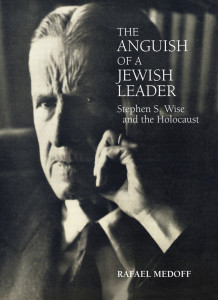
Sources: Medoff, FDR and the Holocaust, pp.39-72; Medoff and Golinkin, The Student Struggle Against the Holocaust, pp.30-42.



